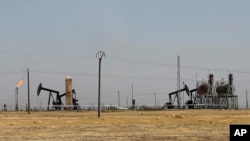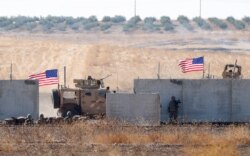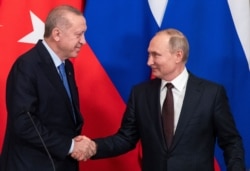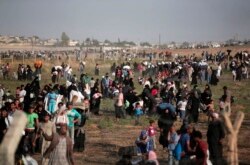Turkish President Recep Tayyip Erdogan has said that Syrian oil revenues should be used to rebuild the war-torn country, raising concerns among Kurdish forces — which control most of the oil fields in eastern Syria — that such Turkish plans could threaten their own presence.
Erdogan told reporters last week that he has proposed the idea to Russian President Vladimir Putin.
"With the help of oil revenues generated there, we could assume the construction side, if you extend support in terms of financing. Let's bring ruined Syria to its feet. And Putin said that his could be possible," the Turkish president said, referring to an earlier conversation he has had with his Russian counterpart.
Erdogan referred to the Syrian cities of Qamishli in northeast and Deir al-Zour in the east as two areas with abundant oil reserves.
Both regions are under the control of Syrian Democratic Forces (SDF), a Kurdish-led military alliance that has been a major U.S. partner in the fight against the Islamic State (IS) terror group.
SDF officials said Turkey has long been planning to reach these oil-rich areas in the eastern part of Syria.
"Turkey definitely wants us removed from these areas, including Deir al-Zour," said a senior SDF official, who spoke to VOA on the condition of anonymity.
Turkey "will try anything to make sure that the SDF and the local population in eastern Syria don't benefit from their own natural resources," the Kurdish official said.
Ankara views the SDF as an extension of the Turkey-based Kurdistan Workers' Party (PKK), which is designated as a terrorist organization by Turkey and the United States.
Last October, Turkish military and allied Syrian militias launched a major campaign that removed SDF fighters from several Syrian towns bordering Turkey.
"Instead of terrorists benefiting here, we would have the opportunity to rebuild Syria from [oil] revenues," Erdogan said in his remarks last week.
Pressure on the U.S.
The Turkish president said he could make the same proposal to U.S. President Donald Trump.
But experts believe that this move by Turkey could be a way to put pressure on the U.S., which currently has about 600 troops stationed in eastern Syria.
"Erdogan has been trying to convince the Americans to partner with Turkey in eastern Syria," Omar Abu Layla, director of Deir Ezzor 24, a news and research group focused on developments in eastern Syria.
U.S. officials have said that American forces are in eastern Syria to prevent IS militants and Syrian government forces from accessing the oil fields.
Abu Layla said Turkey doesn't have enough leverage to convince the U.S. to allow Turkey into eastern Syria.
"When it comes to Syria, I don't think the U.S. at this point trusts Turkey, especially now that the latter is increasingly cooperating with Russia," he told VOA.
In recent weeks, the U.S. has been increasing its military presence in eastern Syria, sending additional reinforcement and delivering equipment to the SDF, local news reported.
Abu Layla said that given the current circumstances, "the U.S. has plans to remain in eastern Syria for some time."
'Wake-up call'
Turkey will continue to work with Russia and Iran, despite efforts by a narrow circle of realists in Washington that has been trying to offer Turkey as a potential counterweight to Russia, Iran, and the Syrian regime, some experts believe.
Earlier this month, Turkey and Russia, who support opposing sides of the Syrian conflict, reached an agreement that halted a Russian-backed Syrian government offensive on the northwestern Syrian province of Idlib, the last rebel stronghold in Syria.
"Erdogan quickly turned to Putin not only to cut a deal in Idlib but also to offer him the oil fields currently controlled by the U.S.-backed [SDF]," said Aykan Erdemir, a senior analyst at the Foundation for Defense of Democracies (FDD) in Washington.
"This should be a wake-up call to Washington's realist policy circles who devise plans around a potential U.S.-Turkish partnership to contain Russian and Iranian hegemonic ambitions in the Middle East," he told VOA.
Erdemir added that, "As long as the Erdogan government continues to see the development of any self-governance capacity for the Syrian Kurds as an existential threat to Turkey, Ankara will find excuses to cut deals with Moscow and Tehran at the expense of Washington and its Syrian partners."
Resettling refugees
For some time now, Turkey has been floating the idea of constructing new cities along the Turkey-Syria border, on the Syrian side, to resettle Syrian refugees who are living in Turkey.
Turkey currently hosts more than 3.5 million Syrian refugees who have fled the war in their country, according to the U.N.
Experts said the rebuilding of Syria that Turkish president Erdogan was referring to last week is most likely to support his government's plans for resettling Syrian refugees back in their country.
However, "Erdogan's resettling policy is not in line with the international refugee laws as refugees cannot be sent to a country against their will," said Ilhan Tanir, an editor with Ahval News, a Turkish website.
Tanir added that as Turkey's economy continues to struggle, Ankara looks for other ways to fund its project in Syria.
"Now Erdogan wants to convince the Trump administration to transfer the income of the oil of eastern Syria," he told VOA, noting that "his request of the oil money is not supported by any international financial, political body or foreign country; therefore, it is bound to fail."








